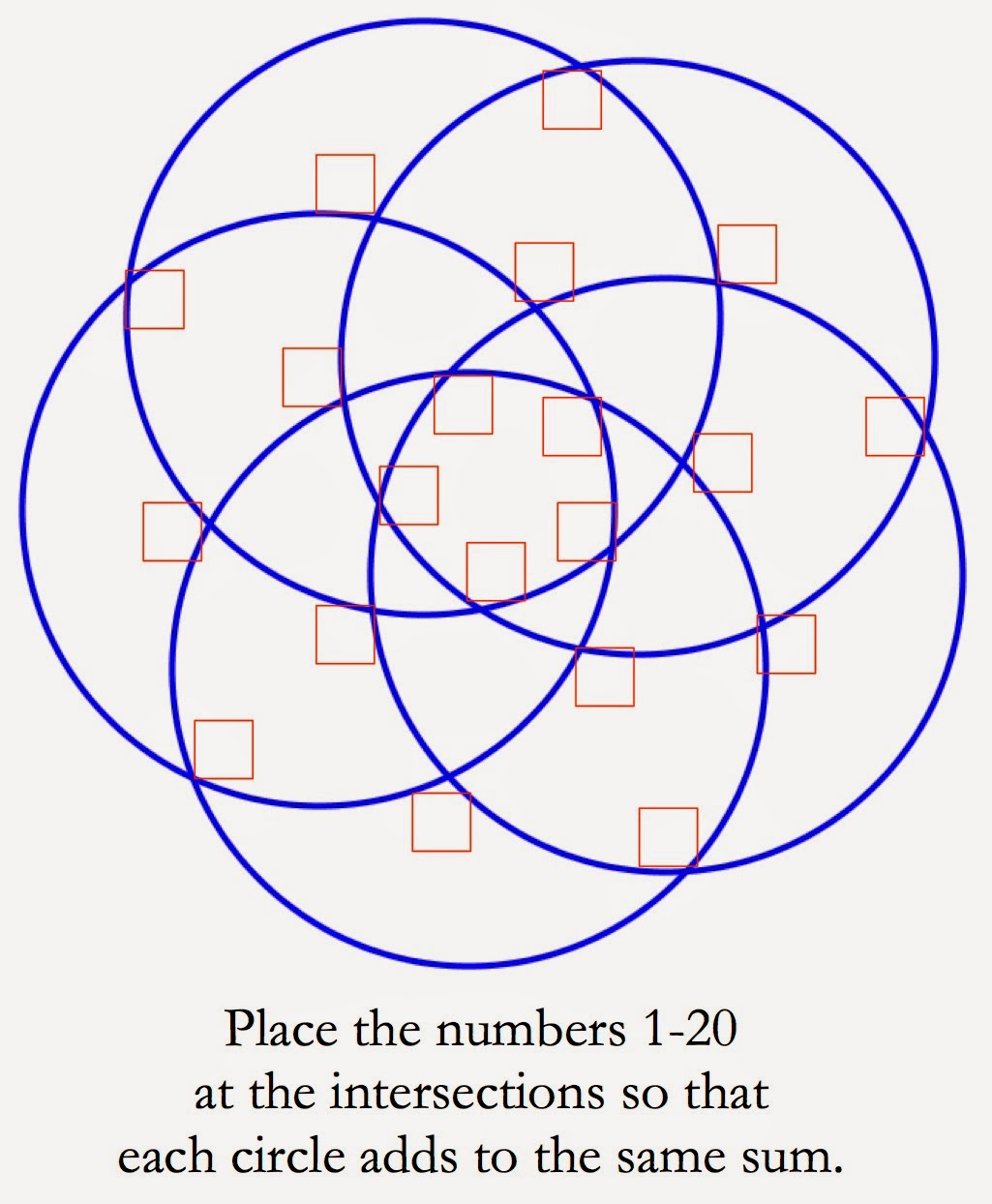84 is a portentous number. It's the sum of twin primes (What's the previous sum of twin primes? Next?). It's thrice perfect, twice everything. It's positively Orwellian. It's even a town in Pennsylvania. It's a game (actually a variant of the domino game 42 if you play with 2 sets.) It is the #edtech that shall not be named.
 |
| (click for full size image) |
Number the intersections of these five circles with the integers 1 to 20 so that the points on each circle sum to the same.
An exciting development this week was Jed Butler unveiling the Math Twitter Blog-o-Sphere Directory. It will be a great resource, but only if you add your information! Maybe you blog, maybe you tweet, maybe not... but you are a mathy type on the interwebs or you wouldn't be reading this!

What to Read?
It was a good month for math reading related posts.
- Stephen Cavadino collected some of his favorite math reads,
- Ben Orlin wrote about how he missed reading in his math major, and
- Michael Fenton popped the question in #slowmathchat on Twitter. (Here's the collected responses.)
- Paula Krieg, a teaching artist, made the books in a neat fraction representation project.
- Ed Southall (@solvemymaths) has been slowly building a fun library of Mr. Men, and here's a poster pack.
84 Puzzler 2
84 is a side length in the smallest integer perfect tetrahedron, and is tetrahedral number to boot. Which triangular pyramid has 84 points? How many points in the nth pyramid?
(Image made in GeoGebra 3D)
Tool Tips
- Wilson Burgess is thinking about appropriate tool use.
- Simon Gregg used Scratch for a prime factors game. (Version 1)
- Audrey McLaren is teaching logarithms using suspense. And GeoGebra.
- Michael Fenton assembled a mighty series of Desmos challenges.
Attributed
- A. O. Fradkin is exploring counter-examples to push the idea of What is a Rectangle? (Also see the follow up Cutting Corners.)
- Mary Bourassa started a Which One Doesn't Belong? website (her announcement), inspired by the great Christopher Danielson activities.
- Graham Fletcher introduced fractions with a tough tangram activity that highlighted misconceptions.
- Mike Lawler shares the most amazing family math, often with video of the kids' insights. Here's his account of a fun ZomeTool exploration, and part 2 that digs a bit deeper.
84 Puzzler 3
What is the odd pattern that produces these multiples of 84? Highlight for hint: 7 is involved.
0, 2184, 78120, 823526, 4782960, ...
Why Do We Do the Things We Do?
- Manan Shah is griping (productively) about Truth Tables. (He also regularly produces a comic, like the one at right.)
- Malke Rosenfeld tried out a representation game with some of her elementary Math in Your Feet students. It helped her understand her own objectives!
- Ilana Horn illuminates classroom culture through the lens of social class. Read this one twice.
- Denise Gaskins pens the Math Student's Manifesto.
Lesson Lab
- Lisa Bejarano is right - she's been blogging a lot! For example, this lesson introducing surface area through a pop-box project. Also must-see is her virtual filing cabinet of warm up ideas.
- Joe Schwartz has a great measurement lesson to get at a challenging standard: measure to the nearest quarter inch.
- Fawn Nguyen made a lesson out of a test - great genre work.
- Jim Doherty is fighting for understanding with proportions and one variable equations.
- Jo Morgan assembles a redonkulous amount of cool maths resources, but here are her thoughts from a workshop on a myriad of ways to teach HCF. (math & GCF in American.)
- Bethany uses credits and debits to start developing integer fluency.
That concludes the carnival; 84 cheers! Remember, you can submit posts to the next carnival via Denise's MTaP form. If you didn't see last month's Carnival 83, it was at CavMaths. We're looking for a host for Carnival 85 - can we come over to play at your blog? Email the Founder of This Here Shindig to give the all clear. Thanks to everyone who pitched in with submissions!
Number fact references: Archimedes Lab, MathWorld and Wikipedia.
GeoGebra sketch of the tetrahedral numbers.












